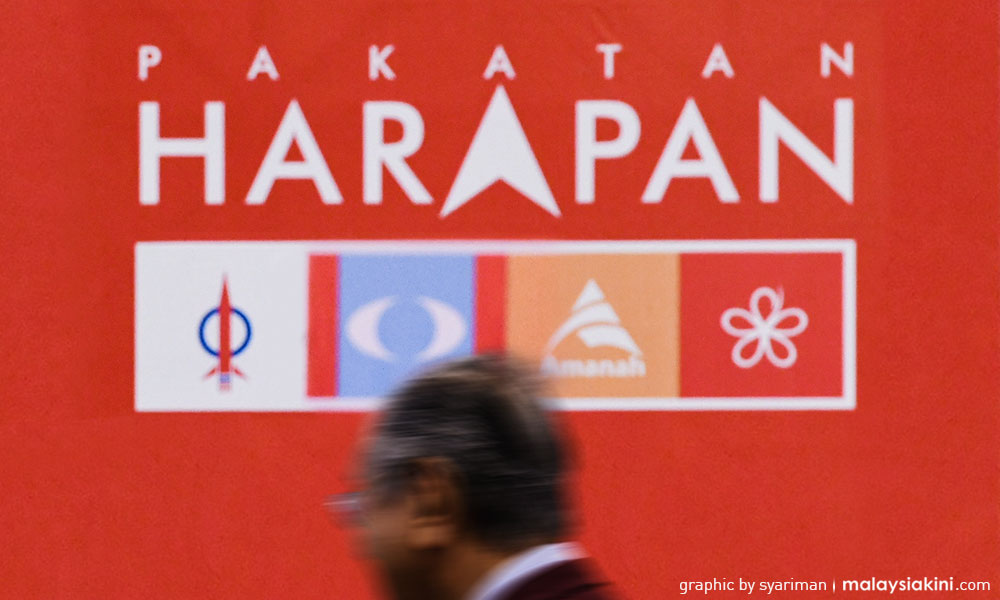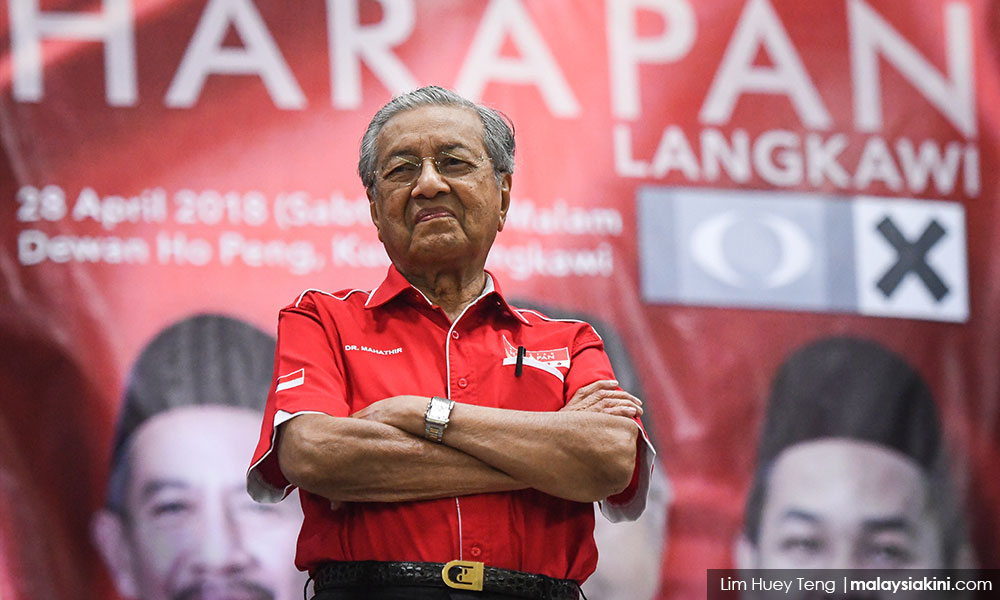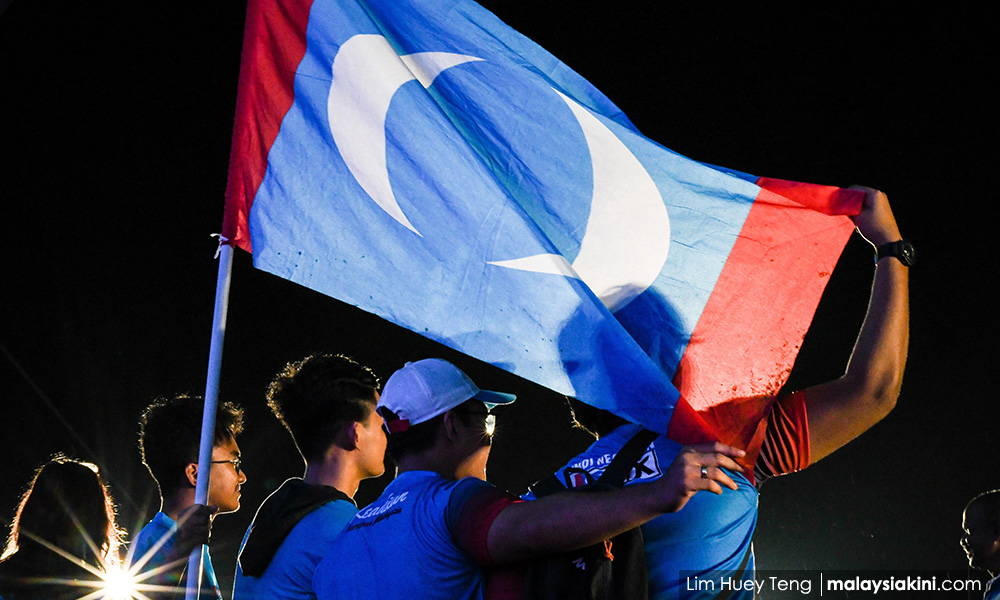
A seasoned analyst does what a seasoned analyst does: reuse the same optic, potentially, the same pool of political whisperers too.
Contrary to what Joceline Tan of may believe, Prime Minister Dr Mahathir Mohamad is not defined by Bersatu, let alone his own age, nor is Bersatu shaped by Mahathir mainly.
Her article weaves in, and out based, mutatis mutandis, on the above logic: the man and the movement are entwined, nor will the twain ever separate.
Thus, Tan's oft-repeated assertions, with the help of her sources, that Bersatu is only as successful as how Mahathir leads it, be it keeping a close tab on racial and religious tensions, and the rising cost of living, and the underperforming cabinet ministers from his own party.
Tan is wrong precisely because Malaysian politics is no longer shaped by the nomenclature of a strong man, a group of racially sensitive Malays or Chinese or Indians, let alone a single or multivariate preoccupation with the economic pressures at hand.
The above is what politicians believe to be relevant. Yet Pippa Norris, at Harvard University, who has done a lot of analysis on democratic suffrage, has time and again, warned of the growing emergence of voters that post values.
Malaysians want change, precisely because change is the common denominator of all the issues that can be loosely grouped and clustered under a single rubric.
Thus the concern with the environment, wastage of public funds, over infusion of sanctimonious religious values in the education system, and the list goes on.

With or without the effects of "bowling alone," a phenomenon described by Robert Putnam, a colleague at Norris at Harvard, more and more voters are sick of the same.
In an electoral system that is shaped by race, religion, rent, and royalty, or at least the loyalty of each to every one of them, it is easy to be misled into believing that only the 4 Rs matter, that nothing else ever does.
But look at the electoral trends between 1998 to 2018, over a span of 20 years. No one strong man can defend the fort. Anwar Ibrahim tried to trigger a one-man reform movement but failed in 1998. Abdullah Ahmad Badawi succeeded momentarily in 2004 only to crash and burn Umno and BN in 2008, which neither ever recovered from.
Using a presidential system of the election campaign, Najib Razak Abdul plastered his name all over the constituencies. Yet the ethnic Chinese and Indians abandoned him in 2013.
In 2018, Mahathir positioned himself as the leader of Bersatu, but his electoral victories were far and few between at the parliamentary and state level.
Thus it stretches the belief of Tan that Bersatu is merely riding on the "coattails of Bersatu". If anything, Bersatu was trying to free ride on the pro-opposition frenzy in the lead up to the May 9, 2018 election; based on post values voters.
In a post values ecology, no one wins hands-down. It all depends on how the politicians can appeal to the various segment of voters across the age, industries, agricultural sectors and even avant-garde plan of opposing purely for the same of opposing.
May 9 was against all conventional wisdom since only a rupture of the old paradigm can create a new agreement of how a new Malaysia can be created.

Malaysians were against not merely kleptocracy or kakistocracy, but the total break down of "nomocracy" - the rule of law.
Almost everyone knew it would be a risk to put Bersatu on the perch, either at the front line or at the top. The same goes for Amanah, as it was a splinter party from PAS, which is no less corrupt. Yet knowing that the nomenclature of May 9 was predominantly towards change, rather than all things that remain perpetually the same - the voters of the post and all persuasions took a systemic gamble to throw all out with the hope that the new would come in with a more radical mindset to upend the old order.
But at the rate at which Bersatu, Amanah, and DAP can be spooked by racial extremists, even royalties, all three have counselled patience, the problems left by the previous administration were way too big.
They are not big. If they were big, all the credit rating agencies would have downgraded the ratings of Malaysia, if not by July, definitely by October 2018.
The national debt of US$280.7 billion seems large in proportion to a Malaysian GDP of US$320 billion only. But then the catch is this: while the GDP can grow, the debt will shrink under a new administration too. That alone is enough to convey some degree of fiscal responsibility.
What PKR needs to do, since it is the largest party in parliament, is to counsel all the rest of the coalition partners to look beyond the 4 Rs (Rent, Race, Religion and Royalties, to put their mind on 4 Vs.
Voters, not unlike an iPhone user looking for the new version, and forking out thousands to change their models, are enamoured with any politicians that can ensure the other 4 Vs: new vision, values, and a modest vivendi to co-exist with globalization, with the aim to raise the vigour of the local politics viz a viz contemporary international and economic relations.
The net effect of the four Vs is a total pivot from the old to new Malaysia regardless of who is at the top or bottom. Take the Minister of Education, Dr Mazslee Malik, for instance. Unless and until he can talk about the Program of International Student Assessment (PISA) which is pegged to the education standards of the Organization of Economic Cooperation and Development (OECD), he would be going round and round the circle, not knowing when his critics can get off his backs.
But if the PISA score of Malaysia improves dramatically, an exam held thrice a year, which is respected globally, Mazlee would be the one laughing at his cynics and be in a strong position to win again in 2023.
RAIS HUSSIN is a supreme council member of Bersatu. He also heads its policy and strategy bureau. - Mkini


No comments:
Post a Comment
Note: Only a member of this blog may post a comment.